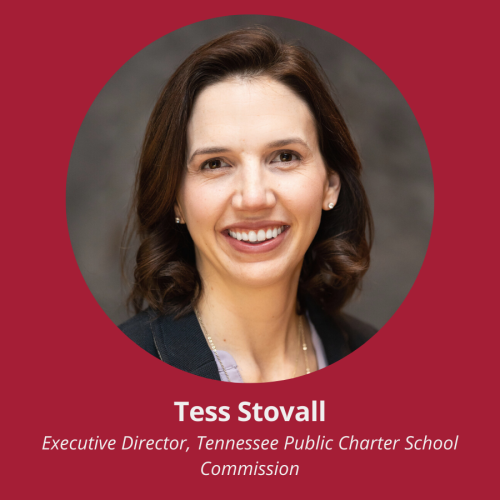Across the country, the dual challenges of an ongoing pandemic and racial inequities continue to impact our schools. But educators, school leaders, and authorizers across the country have been working to meet this moment.
At the 2021 NACSA Leadership Conference our plenary featured four women change makers who inspired us with stories about perseverance in the face of racism, sexism, and the myriad challenges facing students and schools. We decided to shine a light on more change makers for our 2021 Change Maker Series.
Read below — and stay tuned for more change makers being added to this post throughout the month of December.
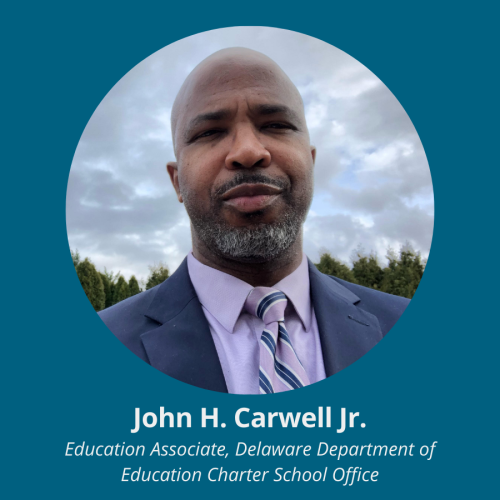 John H. Carwell Jr.
John H. Carwell Jr.
Education Associate, Delaware Department of Education Charter School Office
Did you find education or did education find you?
Education found me. I have served as an authorizer for a little over 11 years at the Delaware Department of Education. When I enrolled in graduate school my plan was to earn a master of social work and establish a private counseling practice. As a graduate student, I served middle- and high school students, providing individual and group counseling to help them navigate socio-emotional challenges and eventually thrive. This was long before social-emotional learning (SEL) became more acceptable in education. I quickly realized that my efforts would barely scratch the surface of the problems my clients faced unless I pursued more systemic solutions. In my second year of graduate school, a friend introduced me to the Presidential Management Fellowship (PMF) program and I applied. Fortunately, I was selected and hired by the U.S. Department of Education. The PMF program provided invaluable education experience at the federal level and launched my career in public education. Over twenty years have passed since I served at the U.S. Department of Education. Since then I’ve held leadership roles in public education at the district and state levels and education support roles in the philanthropy sector.
Tell us a change you’ve been a part of.
In the summer of 2020, the National Charter School Institute invited me to join a national planning team to design a series of professional development sessions we called the “Authorizing for All: Anti-Racism Project.” The project was designed for education leaders to address racism and inequity in public education. On February 24, 2021, we convened the first of six sessions with an inaugural cohort of 40+ authorizers, school leaders, and executive directors from across the nation. The final session was held on June 9, 2021. We plan to relaunch A4A with a second cohort in January 2022. This work is uniquely spiritual for me. With every fiber of my being I believe that systemic change in public education is achievable in my lifetime.
The A4A planning team met weekly to design the sessions. From the outset our goal was to create a brave space for participants and facilitate a “productive discomfort” that challenged participants to reimagine themselves as “equity designers.” Our objectives were to increase participants’ self-awareness regarding their personal biases and locate themselves on the “Non-Racist to Anti-Racist” continuum. Additionally, the sessions incorporated professional learning based on design thinking theory and best practices to help participants design projects to address issues of diversity, equity, and inclusion in their respective spheres of influence. As a result of A4A, I was invited to be a presenter at the Delaware Department of Education’s annual Equity Summit in October 2021 and I’ve received requests to support equity initiatives in other states.
What change are you looking forward to in education or your community?
Three years ago, my life entered a virtuous cycle that continues upward. Persistent problems of practice in authorizing began to appear less daunting and creative solutions began to multiply. In 2019, my career was seemingly struck by lightning when I attended an alumni convening for NACSA’s Leaders Program. All of the sessions were very engaging but, one session, in particular, was the match that ignited the blaze. The session presenter was Dr. Jeff Duncan-Andrade, associate professor of Latina/o Studies and Race and Resistance at San Francisco State University. He masterfully articulated the calamitous impacts of racism on BIPOC children and their communities, but most importantly, he presented inspiring, innovative solutions to transform public education. Dr. Duncan-Andrade helped revolutionize my thinking regarding equity. Ironically, the COVID-19 pandemic only served to strengthen my resolve because it provided an opportunity for deeper introspection.
In 2018, I began to forge partnerships with national and local partners who have inspired innovative approaches to persistent problems. For example, I’m currently leading a project to develop additional measures to determine school quality that will supplement our state’s school accountability framework. Like most accountability frameworks, our framework does not provide the fullest story about school performance, especially for schools that serve high proportions of educationally disadvantaged students. To inform this work, our office joined the Advancing Great Authorizing and Modeling Excellence (A-GAME) project co-directed by the National Charter Schools Institute (NCSI) and Momentum Strategy and Research (MSR). Our partners worked with us and our pilot school to develop additional performance measures and we plan to apply these findings across our entire charter school portfolio to inform high-stakes decisions.
We are working to shift authorizing from the “old school” approach of holding up a mirror to schools on an annual basis and telling them their beautiful or ugly. Why leave school improvement to chance? Some struggling schools improve but many do not. The “new school” approach to authorizing is to better assess performance and provide supports instead of letting students and families suffer while their schools die on the vine before they are identified for mandated interventions and supports under the Every Student Succeeds Act (ESSA).
Tess Stovall
Executive Director, Tennessee Public Charter School Commission
Did you find education, or did education find you?
I come from a family passionate about education, but I personally found my initial calling in the world of policy and politics. I’ve always believed in public service and been interested in how to create systems and practices that serve citizens well. It was only when I found myself in the role of a charter school authorizer did I realize that my family’s passion for education and my calling for policy and process had found its sweet spot for me. It is truly the best of both worlds for me personally and professionally as I get to ensure the systems, policies, and processes are in place to create spaces for quality education for kids.
Tell us a change you’ve been a part of.
I’ve been lucky to be in the charter authorizing space in Tennessee since 2014, and, in 2020, I was hired as the Executive Director of the Tennessee Public Charter School Commission. The Commission was created by the General Assembly of Tennessee to be a state-wide charter school authorizer and to be a model authorizer for the state. It is an independent state entity that serves as both an appellate authorizer and school district for our portfolio of schools. Currently, we authorize four schools across Tennessee, and our portfolio will grow as we move into the 2022-23 school year. Creating opportunities for parents to access high quality school options is my passion and the driving force behind my work.
What change are you looking forward to in education or your community?
I am grateful to have been so involved in the charter school sector in Tennessee, and I am looking forward to continuing to create high-quality charter school options in Tennessee and holding a high bar of expectations for performance. In the next year, the Charter Commission will implement a transition of charter schools who have operated within the Tennessee Achievement School District to authorization under the Commission. I look forward to the opportunity to allow the charter schools that have successfully served some of the most at-risk students in Tennessee to continue their hard work under the Commission. Moreover, I’m excited to strengthen the charter school sector in Tennessee and ensure that we are consistently holding high expectations for our schools and students.
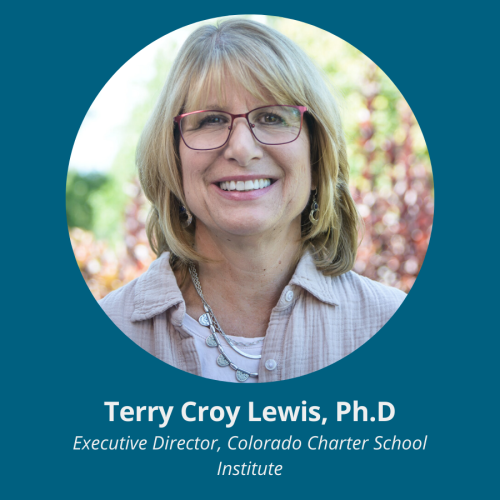
Terry Croy Lewis, Ph.D.
Executive Director, Colorado Charter School Institute
Did you find education or did education find you?
Reflecting on my journey, it’s hard to decide if education found me or if I found education. The easy answer is- a bit of both. When I was twelve years old, I decided that I wanted to be a legislative staff member. How I came up with that idea I’ll never know! My parents did not have college degrees, and they didn’t have any interest in politics or public policy. Simply a crazy idea! Eventually I decided that I should probably go to law school, but through different twists and turns I ended up in graduate school and discovered that I loved teaching undergraduate students. This led to a good amount of time in higher education, and along the way I decided to start a K-8 charter school with a friend to provide an option that didn’t exist for the community in which I lived. At the core, I believed that preparing students for a rich undergraduate experience requires a strong foundation in the early years. After starting my first school, I was hooked and I slowly moved away from higher ed into K-12 charter schools.
Tell us a change you’ve been a part of.
Schools change lives; schools change communities! That’s the essential tenet that guides my work. I’m incredibly fortunate that I have helped build schools that have made long-lasting impacts in their communities. While I started my first school solely focused on the mission, curriculum, and educational programming, through the process, I learned that building a community of shared values that brings people together is ultimately why I do this work. I’m proud that I have dedicated a great amount of my professional life to building communities through creating and supporting strong schools. Over the years, I have called myself a social activist, advocate, educator, and leader, but I’m drawn to the term “Change Maker” given that I’m particularly proud of working with others to change the lives of students and communities.
What change are you looking forward to in education or your community?
I have been relentless in advocating for high-quality schools and elevating parent voices and school choice for students and communities. I became a mother at a fairly young age, and I always believed that my voice should matter in the education of my children.
I believe that every child deserves to be in a school that develops positive relationships with students and excites their learning. Unfortunately, we are losing too many students to apathy and destructive paths. We have the power to change that if we have schools that fit the student as opposed to making students fit the school. I will continue to fight for high-quality and diverse school options for all students in every community. As we continue to grapple with the overwhelming challenges that we are facing, I remain hopeful that there are enough of us willing to be innovative, imaginative, and visionary as we create educational options for our students.
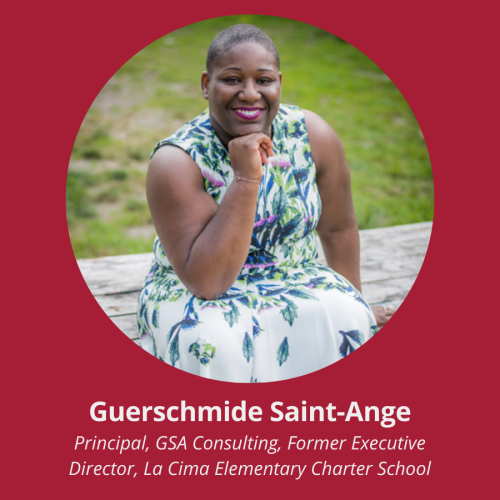 Guerschmide Saint-Ange
Guerschmide Saint-Ange
Principal, GSA Consulting, Former Executive Director, La Cima Elementary Charter School
Did you find education or did education find you?
I can remember a few specific moments that made me say I should get into education. One of them happened when I was in middle school. I saw a billboard that said “if you can read go back and thank a teacher.” I realized some people can go their entire lives without seeing a doctor or needing an attorney, but you can’t go your whole life without someone who teaches something to you — whether a formal teacher or someone you attribute your learning to. I decided then that teaching was the most important job.
I realized quickly that teaching wasn’t going to be the end for me. There is a lot happening in education and teachers aren’t at the table. I went back to school and got a degree in policy because a lot of the issues were political.
What is a change you’ve been a part of?
As an authorizer all of the schools in my portfolio didn’t like their authorizer because it was a watchdog and school leaders didn’t have time to implement changes because they were running their schools. We helped them see that the things we wanted them to do was a part of running their school. We made authorizing feel like thought partnership and helped them see that we allowed this charter so we also have to make sure the school is successful. We can do that by helping you solve problems, get resources, make connections to other schools, etc. Our relationship became partnership and evaluation, where necessary.
What change are you looking forward to in education or your community?
The reason I’m in education is because I believe in making sure every school is a quality school. I heard Michelle Rhee (Former superintendent of DC Public Schools) say: “The school choice movement right now not living up to its highest potential…real choice is when we can take quality for granted.”
My goal is to get this country to a place where we can take quality for granted. That’s what makes this work worth it.
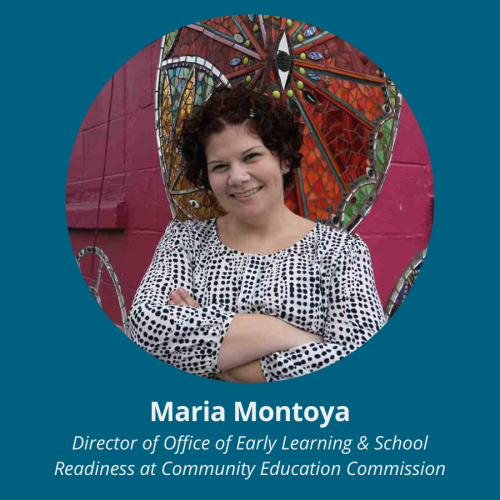
Maria Montoya
Director of Office of Early Learning & School Readiness at Community Education Commission
Did you find education or did education find you?
Hmm… In my case it is a little bit of both! As a former reporter many of my favorite stories were ones where I spent time in a school, but it wasn’t until I became a guardian of children that education became so central to my life. Working with a network of families who felt disconnected from the school system, I blossomed into a full-fledge advocate for quality education for all kids, and was eventually asked to take on a set of equity work within the school district.
Tell us a change you’ve been a part of.
I never would have guessed 10-plus years later that I’d get to work with some of the most innovative folks in child care and education increasing access to all publicly funded programs birth through college. But I have now had the ability to work across the country helping cities eliminate barriers to accessing child care and K-12 seats. I’ve seen school leaders, authorizers, districts and whole communities change their approach in how they offer seats and communicate enrollment processes and policies. It’s never been easy work, but it is truly transformative to watch systems change and barriers kicked down for families.
What change are you looking forward to in education or your community?
It is exciting to see and watch educational leaders actually engage families and communities in how to best serve them during these very trying times. In a good number of communities we are moving away from schools and districts presenting to students and stakeholders plans, and toward planning processes that actively include the voices of those impacted throughout every part of the decision making.
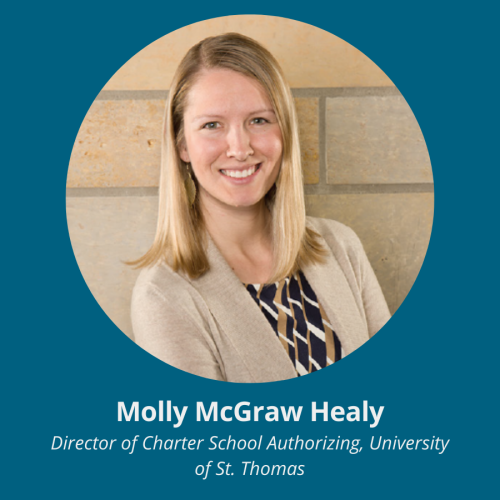 Molly McGraw Healy
Molly McGraw Healy
Director of Charter School Authorizing, University of St. Thomas
Did you find education or did education find you?
I would say both. I found education initially as a college student who wasn’t sure what career path to take. Teaching seemed accessible since, like all of us, I had spent years observing teachers from the student perspective. Education found me after I left the classroom to go back to school and realized that there were so many parts of the field I had never realized existed.
Tell us a change you’ve been a part of.
I started my career at a time of transition for authorizing in Minnesota thanks to changes in our state law. Authorizers were moving from their initial conception as ‘Sponsors’ with few concrete requirements toward a profession with defined duties and expectations for ourselves and our schools. The number of authorizers in the state dropped by half during the first two years of my career, and over time has dropped by half again. Working with my organization to ensure we were aware of and aligned with these shifts was a challenge, but also rewarding as the shifts resulted in a stronger field and better, more transparent accountability for schools.
What change are you looking forward to in education or your community?
Right now I believe we are seeing the pendulum swinging away from the one-measure-fits-all quantitative-only methods of evaluating schools that became particularly popular in the NCLB era. The change I am hoping to see (and be part of) is to develop frameworks for school evaluation that honor the important role of tailored quantitative analysis while also ensuring qualitative metrics that are rigorous and appropriate for the individual school. Trying to embrace what it means to keep equity and students’ ability to reach their full academic and human potential at the center of authorizing work is a challenging and humbling experience, but I am hopeful that our efforts can help inform local and national dialogue in a way that positively impacts individual students and communities.
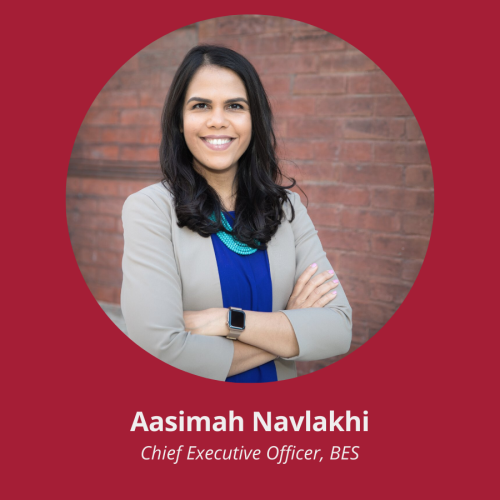 Aasimah Navlakhi
Aasimah Navlakhi
Chief Executive Officer, BES
Did you find education or did education find you?
Education and I grew up together, from my very earliest memories. My parents and grandparents instilled in me how fortunate I was to go to the best schools growing up and to then go to college and graduate school abroad. It was not a given for girls growing up in India to have these opportunities at all, so I knew from very early on that I was benefiting from something special and hard won. I further benefited from amazing teachers who believed in me. The combination of my family’s commitment to education and the both challenging and inspiring experiences I had in school really shaped who I am. For me, committing my professional life to expanding the number of children and families who benefit from an excellent, culturally relevant, and respectful education is a continuation of my life-long relationship with education.
What is a change you’ve been a part of?
Over the last couple of years BES has changed from Building Excellent Schools to Build Excel Sustain. The name change belies a deeper set of shifts at BES from our core values to our strategic plan to our commitment to becoming an actively anti-racist organization. I had the amazing opportunity to be a part of the team at BES for many years before stepping into the role of CEO. I had the chance to really learn from our strengths and what we have been doing well for a long time as well as to look forward and imagine how we might address some of our deepest challenges. The evolution is not complete – as anyone working at BES would also tell you – but we are making real progress toward becoming an organization that honors our history and foundations and also responds to the feedback of our alumni and the needs of communities. As reflected in our name change, a lot of that is about focusing on building schools that excel quickly – academically and culturally – and are built to sustain as part of their communities for decades to come. It is a recognition that a school’s launch is the beginning of our journey together and not the end.
What change are you looking forward to in education or your community?
One change I’m looking forward to in education is for all of us to be more responsive to the communities in which we operate. For BES, that means moving away from replicating one “no excuses” school model and toward active engagement with communities and families to determine what school model is needed. For some of our leaders, that has meant changing the models they initially envisioned or opening with different grade levels. True community co-design goes way beyond choosing mascots and colors to actually envisioning and building schools that respond to community needs and that community members have active voices that are honored in school decision-making in perpetuity. We have not arrived at this vision yet, but we are actively working toward it. We are so grateful to communities willing to engage in these conversations with us at BES as well as with our leaders. We have benefited from some flexible support from philanthropists willing to support us to go to communities where the foundation for community partnership is strong. For all of us, I do think this is going to take a collective mindset shift about building schools that will excel and sustain over time as community institutions vs. focusing so much on launching a high volume of schools quickly. For philanthropists, this means a recognition of the time that goes into building authentic relationships in communities and also time to change plans to respond to what leaders learn. For authorizers, this means prioritizing community relationships and involvement as part of the foundation for launching in concrete, measurable ways that influence decisions.
